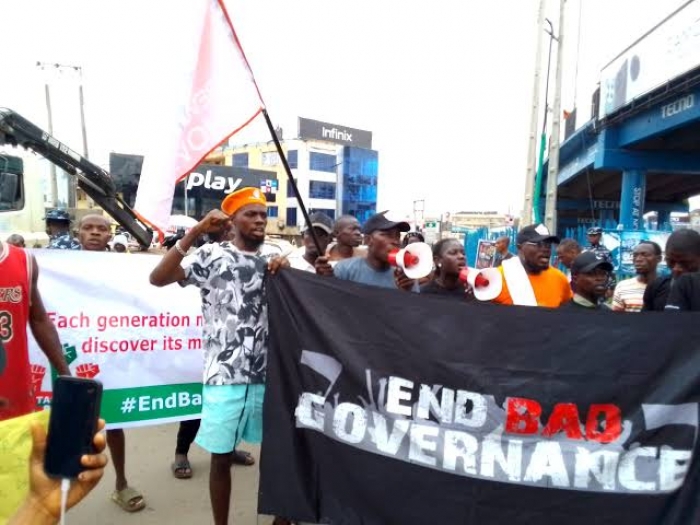Overview
On October 1, 2024, coinciding with Nigeria's 64th Independence Day, protesters across multiple cities in Nigeria took to the streets as part of the #EndBadGovernance movement. This was a continuation of protests held in August 2024, with demonstrators expressing grievances over economic hardships, rising costs of living, and government policies.
Key Points
1. The protests, also known as "National Day of Survival" or "#FearlessInOctober", occurred in several major cities including Lagos, Abuja, Ibadan, Akure, Osogbo, and Port Harcourt.
2. Main grievances included:
- High fuel prices following subsidy removal
- Rising food costs
- Increased electricity tariffs
- General economic hardship and inflation
3. Protesters demanded:
- Reversal of fuel subsidy removal
- Reduction in food prices
- Improved governance
- Release of activists arrested during previous protests
4. Security forces responded with varying levels of force in different locations, including:
- Use of tear gas in Abuja
- Arrests of protest leaders in Kano
- Dispersal of protesters in Rivers State
5. The Nigerian Bar Association (NBA) offered free legal services to protesters facing harassment or unlawful arrest.
Protests by Location
Abuja
- Police fired tear gas at protesters in the Utako market area
- Eagle Square was sealed off by security forces
Lagos
- Peaceful demonstration led by Omoyele Sowore
- Protesters marched from Ikeja to Alausa Secretariat
Ibadan
- Youth-led protest at Mokola roundabout
- Demands included reversal of fuel subsidy removal and reduced living costs
Akure (Ondo State)
- Protesters defied police warnings and marched peacefully
- Commercial drivers and motorcyclists joined the protest
Osogbo (Osun State)
- Protesters marched through major neighborhoods
- Demanded reversal of economic policies
Port Harcourt (Rivers State)
- Police and suspected political thugs dispersed protesters
- Media personnel were prevented from documenting the incident
Kano
- Five protest leaders were allegedly arrested and taken to Abuja
Government and Security Response
- Police in various states issued warnings against protests
- In some areas, security forces monitored protests without intervention
- The National Human Rights Commission (NHRC) warned against rights violations by security agencies
Civil Society Reactions
- The Nigerian Bar Association (NBA) offered free legal services to protesters
- Amnesty International called for the release of detained activists in Kano
- United Action Front of the Civil Society (UAFCS) urged the government to initiate dialogue with protest leaders
Conclusion
The #EndBadGovernance protests 2.0 highlighted ongoing economic challenges and dissatisfaction with government policies in Nigeria. While some protests remained peaceful, others faced security crackdowns. The events underscored the tension between citizens' right to protest and government efforts to maintain public order.
